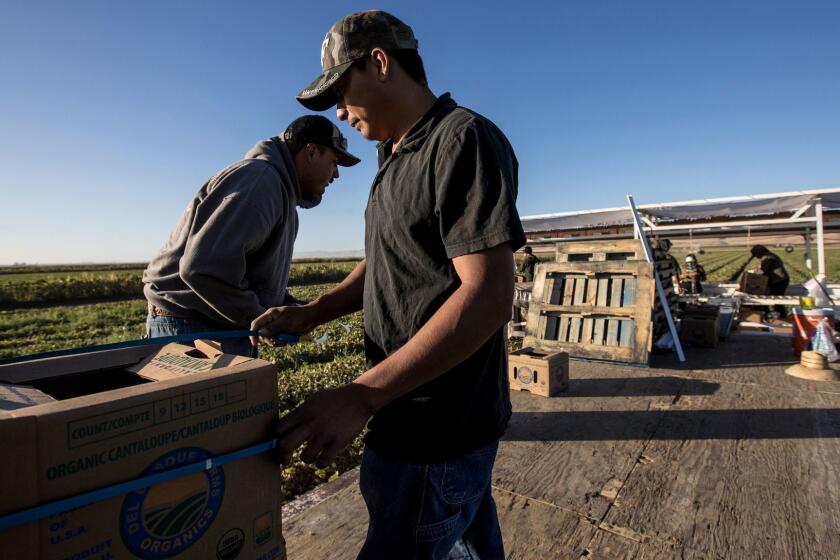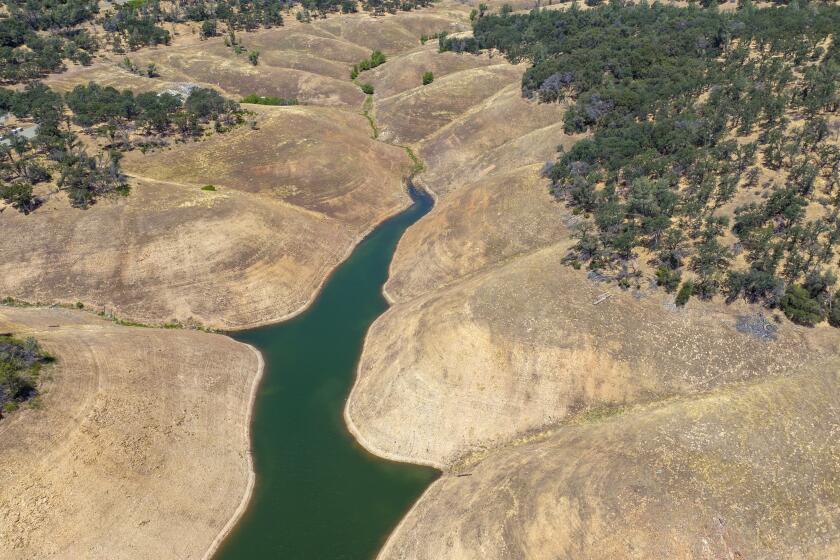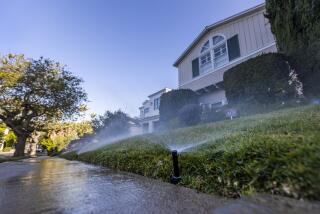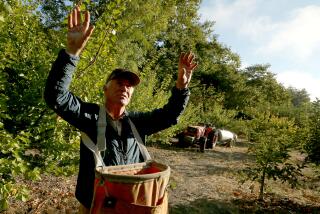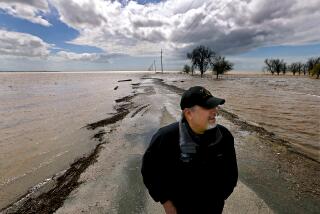Op-Ed: The drought is decimating my farm and many others. What California should do to help us
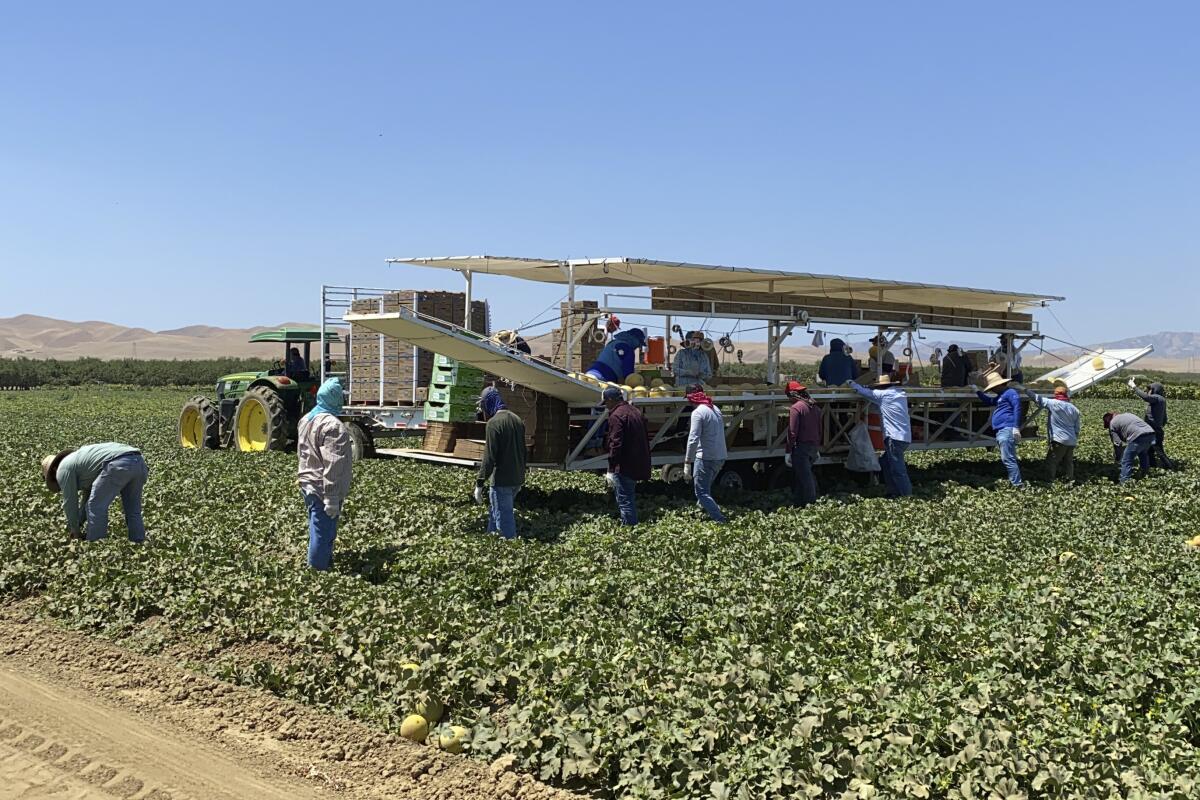
- Share via
As I drive across my family’s farm in the San Joaquin Valley, it feels as if I’m traveling on a chessboard. I cross one square with crops and then another without crops — our fields that must lay fallow. Our farm’s crops have been decimated by the drought.
Last year, reduced water deliveries in the state led to 395,000 acres of cropland being idled, according to UC Merced researchers, and about 8,750 agricultural workers lost their jobs.
On my 2,000-acre farm, we used to produce organic fruit and vegetables — melons, asparagus and sweet corn — in addition to cherries and almonds. Three years of unprecedented drought have altered our landscape. Last year we said goodbye to the asparagus and sweet corn. This year, we cut back on cherries. Next, we’ll reduce our almond acreage.
The Senate needs to follow the House’s lead and pass the Farm Workforce Modernization Act, which would help farms like mine survive.
My workforce is also shrinking. I once employed a full-time staff of 25 and hired more than 300 people at peak harvest. Not anymore.
Again and again, my wife and I have been forced to make a Sophie’s choice. She has the more difficult and wrenching task. I must choose which crops to cut back or eliminate. My wife, who manages our harvest teams, must decide which of the people who work for us will lose their jobs.
Most of our employees have been with us for a long time, some as long as 30 years. They have become family. We provide them with medical benefits and retirement plans. Many have been able to buy their first homes and most of their children go after another American dream — attending college.
My roots in California reach back to the early 1900s, when my ancestors came here from Mexico. As a child, I picked melons alongside my father, a second-generation American who would eventually manage a melon farm. In 1985, when I was 36, I was able to buy and begin running my own farm growing melons in the Central Valley.
Now, at 73, I worry about the future of Del Bosque Farms. Passing it on to the next generation has always been a goal for my wife and me.
Drought is a silent disaster. It is not evidenced by visible damage but by the blank chess squares on our farms where crops aren’t growing and people aren’t working. Most consumers never see this, but they witness the fallout from it — the empty spaces on their supermarket shelves and the higher prices at the checkout stand.
Contending with drought is nothing new for California’s $49-billion agricultural industry. But we are experiencing a mega-drought, made worse by human-caused climate change. Scientists say we’re in the midst of the driest 22-year period in the western U.S. in at least 1,200 years.
Without enough water, farmers in California can’t survive. The state’s aging water supply infrastructure has not kept up with the growth of the state. It no longer has the capacity or capability to provide for the state’s population and its food production. Over the next 30 years, water supply cuts are projected to lead to the permanent loss of 1 million acres of productive farmland in California.
It is vital that the state adapt to more erratic precipitation and weather patterns.
In 2014, Californians resoundingly voted for Proposition 1, a $7.5-billion water bond for water supply infrastructure. The Los Angeles Times called it “a first step” in addressing the state’s water needs. But water storage projects that should have been built have been underfunded or are stuck in the permitting process, bogged down by incessant testimony and objections by organizations that don’t want any more water projects built, no matter how badly they are needed.
Recently, The Times reported that California has made some progress when it comes to implementing regulations and better managing groundwater, but the state is still a long way from sustainability. That could be the mantra of farm owners in the state.
While some of the promises made during the previous drought have been kept, conservation efforts are slipping as well-drilling threatens groundwater.
The Sustainable Groundwater Management Act, a law passed in 2014 that is supposed to address overpumping and help regulate the state’s supplies, is billed as potentially being a plus for farmers because we rely heavily on groundwater for irrigation in light of cutbacks in deliveries from the state.
But farmers see it differently: It might further limit water availability to many areas dependent on groundwater. It could help some farmers, but it will harm others because it will likely take many more acres of farmland out of production.
At Del Bosque Farms, we have been taking action on our own that includes using more efficient drip irrigation, partnering with other farmers to purchase and transfer water, and developing small local storage projects.
But, as CalMatters reported last fall, growers have run out of quick, easy solutions — transformative methods to reduce our water footprint are slow in coming.
Even though we are in a drought, we still experience flooding in California. One solution for our ongoing woes would be to do a better job of capturing more floodwaters that often flow out to the ocean. That would require building more water storage infrastructure.
Regardless, if we continue on the path we are on, drought will eventually checkmate our great state.
Joe L. Del Bosque is the CEO and president of the family-owned Del Bosque Farms in the San Joaquin Valley.
More to Read
A cure for the common opinion
Get thought-provoking perspectives with our weekly newsletter.
You may occasionally receive promotional content from the Los Angeles Times.
